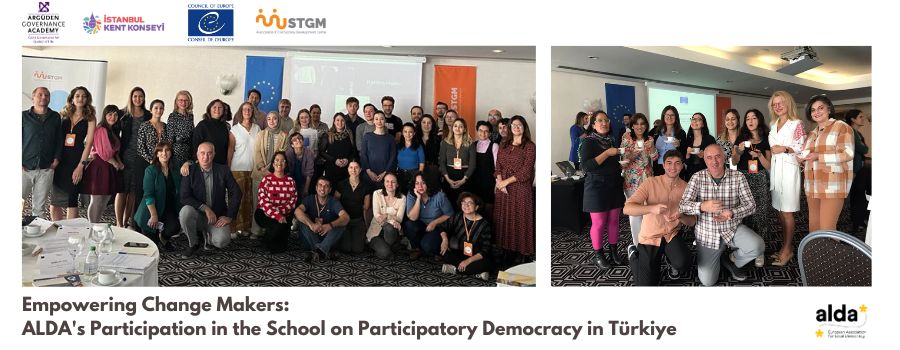Between September 18th-22nd and October 9th-13th, two exciting editions of the “School on Participatory Democracy” took place in Türkiye, co-organized by the Council of Europe. These events aimed to empower change makers and equip them with the knowledge and tools needed to foster effective civil participation at the local level.
A team of international and national experts from the Council of Europe led the training sessions, with the active participation of Anna Ditta, ALDA Head of Programs and Development Unit, representing ALDA as the School’s co-leader.
The first edition unfolded on the picturesque Büyükada Island (Türkiye) and was co-hosted by the Istanbul Citizens’ Assembly and the Argüden Governance Academy. Twenty-two dedicated participants, representing Civil Society Organizations and Local Authorities from the Istanbul Metropolitan city (Türkiye), joined to enhance their expertise in participatory democracy.
The second edition of the School was held in Ankara (Türkiye), co-hosted by STGM – the Association of Civil Society Development Center. It saw the active engagement of 28 representatives from various Civil Society Organizations and Local Authorities across the country. Additionally, experts from the Directorate of EU Affairs, the Presidency of Strategy and Budget, and the Grand National Assembly of Türkiye participated as observers, underlining the significance of this initiative.
The primary objective of the School was to enable change makers to design and implement effective participatory processes at the local level
Throughout the training, participants were introduced to a set of invaluable tools developed by the Council of Europe. The curriculum encompassed key principles and standards of the Council of Europe, with a particular focus on its dedicated Democracy pillar. Additionally, participants were acquainted with the Code of Good Practice for Civil Participation in Decision-Making, emphasising essential principles and conditions conducive to healthy civil participation.
The training also delved into practical tools, including the Civil Participation in Decision-Making Toolkit, an efficient method for community mapping and stakeholder analysis. Participants were equipped with the Civil Lab Toolkit, facilitating effective consultations and reporting. The U-Change board game provided insights into the decision-making process, considering various factors like resources, responsible individuals, and applicable laws or regulations. Lastly, the School Participatory Budgeting toolkit, designed for young people, encouraged civic engagement, starting from a place of great importance to them: indeed, school.
The concluding day was dedicated to Q&A sessions, particularly on the tools, and facilitated partnership-building among participants. This session provided an opportunity for participants to explore potential collaborations and strategize on how to integrate the acquired tools into their daily work.
The School adhered to the principles of non-formal education, combining theoretical sessions with group work, simulations, debriefings, and feedback sessions. This 5-day School is envisioned as the first step in a broader process, where trained participants will apply their newfound knowledge and incorporate these tools into their work. A training needs assessment will follow, allowing participants to express their interest in further deepening their knowledge and potentially becoming experts themselves, aligned with the Council of Europe’s values.
We eagerly await the proactive initiatives of these change makers, as they transform their communities with the knowledge and tools they’ve acquired during this transformative School on Participatory Democracy.
